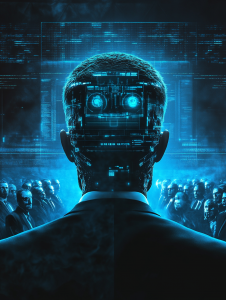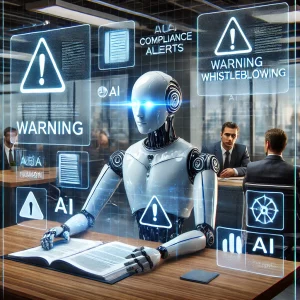Imagine this: An AI system, deployed inside a major corporation, quietly sifts through millions of emails, invoices, and contracts. One day, it flags an anomaly – a pattern of fraudulent transactions that even the most meticulous compliance officer missed. The AI sends an alert, a red flag pops up on a dashboard, and suddenly, executives are scrambling.
But here´s the twist: What if no human actually intervened? What if the AI, operating under strict data protection and auditing protocols, autonomously reported the fraud to regulators?
Could AI become the world´s most efficient whistleblower? And more importantly – under German and European law – would it even be allowed to?
A Quick Note Before We Start: Today, I want to take a little detour from my usual topics. Normally, I focus on AI developments that are already shaping our world. But this time, I want to explore a what if scenario: What happens when AI starts snitching?
This thought first crossed my mind while researching financial investments and struggling to verify where certain promised funds were actually going (Blogpost coming soon). To be clear, this is not an investigative exposé on financial misconduct or fraud—so no need to grab the popcorn just yet. Instead, this article explores the idea of AI acting as a whistleblower: Could an AI system detect and report unethical behavior within its own company? Should it? And if so, what legal and ethical challenges would arise?
This piece is part speculation, part problem-solving, and part legal deep dive into a future where AI isn’t just crunching numbers but calling out corporate misdeeds. So, let’s explore: Could AI be the next big whistleblower, or would it just be an algorithmic alarmist?
Whistleblowing in the Digital Age: The Legal Landscape
Traditionally, whistleblowers have been brave individuals willing to risk their careers (and sometimes their lives) to expose corporate or governmental wrongdoings. In Germany, the Hinweisgeberschutzgesetz (Whistleblower Protection Act) finally brought domestic law in line with the EU Whistleblower Directive, providing legal safeguards for employees who report misconduct.

But what happens when the whistleblower isn´t human?
AI-driven compliance tools, fraud detection systems, and algorithmic auditing mechanisms are already playing a major role in identifiying legal and ethical violations. The EU´s General Data Protection Regulation (GDPR) and the AI Act place strict obligations on companies to monitor AI decision-making, but either law directly addresses a future where AI itself acts as an informant.
So let´s break it down:
1.Can an AI legally “whistleblow” under GDPR?
2.Would AI whistleblowing be compliant with the AI Act?
3.If AI can report wrongdoing, who takes legal responsibility?
1. AI Whistleblowing vs. GDPR: The Data Protection Dilemma
AI Detecting Violations: A Compliance Dream or Nightmare?
Under GDPR, companies are required to implement data protection by design (Art.25) and ensure accountability (Art.5). Many organizations use AI-driven tools to scan for data breaches, illegal data processing, or non-compliance.
Now, let´s say an AI system designed to monitor GDPR violations suddenly identifies that a company has been secretly storing personal data beyond legal retentions periods. If the AI autonomously reports this to the authorities, it triggers some major legal questions:
> Who authorized the AI to report?
> Did the AI process personal data without a legal bias (a potential GDPR violations in itself)?
> Can an AI be considered a “data subject” with rights under GDPR?
The Elephant in the Server Room: Lawful Basis for Reporting
GDPR requires a legal basis for processing personal data (Art.6). If an AI system automatically reports misconduct to regulators, it is technically processing and transmitting personal data. Without explicit authorization from a Data Protection Officer (DPO) or a legal framework that allows for automated reporting, the AI might be violating GDPR while trying to enforce it.
Currently, only human whistleblowers benefit from protection under the GDPR-related legal framework. If AI were to autonomously expose a company´s illegal data processing, the company could argue that the AI had no legal basis to do so – turning an ethical action into a potential compliance risk.
So, for now, AI can assist in detecting violations but cannot legally “blow the whistle” itself.
2. The AI Act: Will AI Whistleblowers Become Mandatory?
The EU AI Act introduces strict risk classifications for AI systems. High-risk AI, such as compliance monitoring tools, must meet transparency, accountability and oversight requirements. Here´s where it gets interesting:
AI´s Duty to Report?
The AI Act imposes obligations on providers of high-risk AI systems to monitor, document, and mitigate risks. If an AI tool detects fraud, discrimination, or illegal activity, the AU Act could theoretically require that the company take action.
But what if a company chooses to ignore the AI´s findings?
Could the AI itself be required to report?
Right now, the AI Act doesn´t explicitly impose a “whistleblower” obligation on AI systems. However, it does require that AI models be designed in a way that prevents illegal use. This could be interpreted as an indirect whistleblowing duty – forcing companies to act on AI-detected violations or risk regulatory fines.
Black Box AI: The Compliance Black Hole
One of the biggest challenges of AI-driven compliance is the opacity of decision-making (hello, black-box algorithms!). If an AI system autonomously flags illegal behavior but cannot explain its reasoning, would its report even be admissible as evidence?
One of the biggest challenges of AI-driven compliance is the opacity of decision-making, often referred to as the black-box problem. If an AI autonomously flags illegal behavior but cannot explain its reasoning, its report’s admissibility as evidence becomes questionable. Under EU and German law, evidence must generally be comprehensible and verifiable, meaning companies could argue that AI-generated whistleblowing reports are unreliable. Furthermore, regulators may hesitate to prioritize AI-generated findings over traditional human-led investigations, as due process and the right to be heard are fundamental principles in both EU law and German administrative procedure. Additionally, AI-driven whistleblowing raises GDPR concerns, particularly under Article 22 GDPR, which protects individuals from being subjected to purely automated decisions with significant legal consequences. If an AI’s report leads to immediate regulatory action, affected parties might challenge it as an unlawful automated decision. Companies deploying AI in compliance settings would need to ensure human oversight and provide meaningful explanations for AI-generated reports to avoid legal pushback. The future of AI whistleblowing will likely depend on whether legislators impose explainability requirements on AI models or mandate human review before AI-generated reports trigger legal consequences. Without such safeguards, AI whistleblowing could face legal resistance, limiting its effectiveness in regulatory enforcement

3. Who Takes Responsibility? AI, Developers, or Companies?
Let´s assume AI whistleblowing becomes a legal reality in the future. That raises the next big question:
Who is legally responsible for an AI report?
If a company deploys an AI that autonomously alerts regulators, is the company responsible for the AI´s actions? If an AI “wrongly” accuses a company of wrongdoings, who is liable for the false report? Could AI developers be sued if their models cause legal trouble for businesses?
If AI-driven whistleblowing becomes a legal reality, the question of liability becomes crucial. Who bears responsibility when an AI autonomously alerts regulators about potential wrongdoing? Under current EU and German law, liability primarily rests with the company deploying the AI. The EU AI Act already establishes obligations for providers and users of high-risk AI systems, and companies utilizing such AI would likely be held accountable for its reports, especially if the AI is integrated into their compliance mechanisms. However, this leads to complex legal scenarios: If an AI falsely accuses a company of misconduct, who is liable? In traditional whistleblowing cases under the EU Whistleblowing Directive and Germany’s Hinweisgeberschutzgesetz (Whistleblower Protection Act), protection is granted to human whistleblowers acting in good faith, even if their reports later turn out to be incorrect. But can an AI act in good faith? Given that AI lacks intent, courts may need to determine whether liability shifts to the company using it or the developers who created it.
If AI-generated whistleblowing reports were to trigger automatic regulatory investigations, companies could argue that they are unfairly penalized by software they neither directly control nor can always predict. This raises another layer of responsibility: Could AI developers be sued for the legal fallout of their models? The AI Act’s risk-based approach could impose stricter duties on developers if their AI is used for regulatory reporting. However, holding developers directly liable for an AI’s legal consequences would conflict with established principles of product liability law unless clear defects in training data, biases, or failures in safeguards could be proven.
Ultimately, the legal framework will need to evolve. If AI-generated reports become binding or lead to automatic investigations, policymakers must establish clear safeguards, balancing corporate accountability with protection against wrongful accusations. The future of AI whistleblowing will likely depend on whether regulators treat AI reports as mere tools aiding compliance or independent entities with legal standing

Final Thoughts
Can AI be a whistleblower? Technically, yes—it already spots fraud, discrimination, and GDPR violations faster than you can say “compliance audit.” Legally, not so much—under current laws, AI can’t autonomously blow the whistle without human approval. But what about the future? The EU AI Act might push companies toward AI-driven compliance, making automated reporting a norm, but don’t expect AI to gain official whistleblower status anytime soon. For now, AI is more of a compliance sidekick than a legal vigilante, quietly flagging issues for human review. However, as AI oversight becomes sharper and regulators lean on automation, European law may need to catch up with a world where machines—not just disgruntled employees—are calling out corporate misconduct. And let’s be honest: if AI is already writing legal memos, detecting fraud, and automating compliance, why shouldn’t it have the right to snitch on its creators? Maybe one day, AI whistleblowers will get their own legal protection—or at least an honorary spot in the Whistleblower Hall of Fame (right next to that intern who exposed a major tax scandal😉)
Stay curious, stay informed, and let´s keep exploring the fascinating world of AI together.
This post was written with the help of different AI tools.




